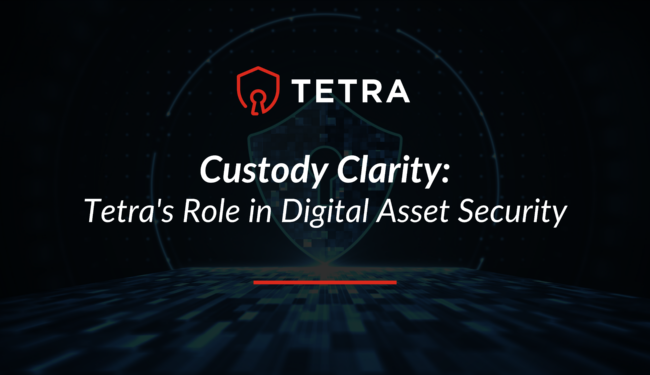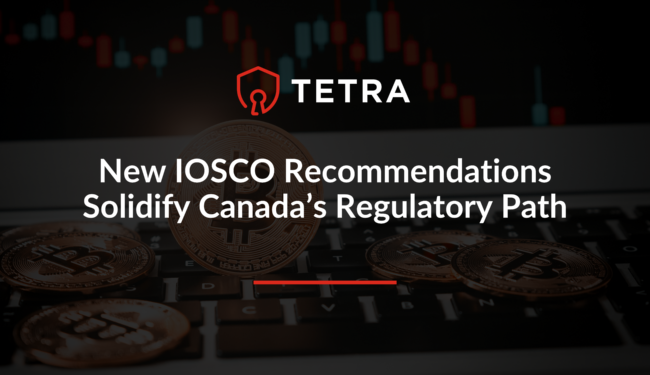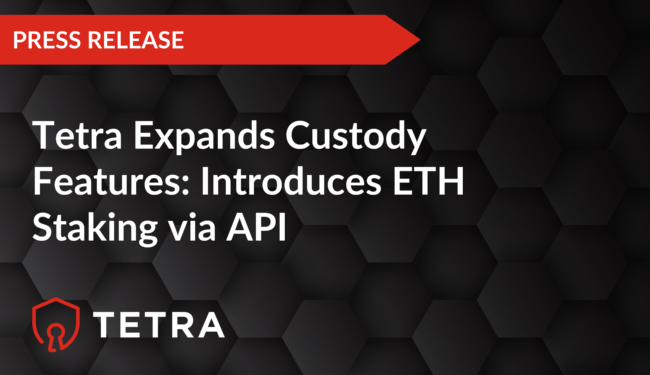It Has Never Been More Important to Know Where Your Digital Assets are Stored
The unfolding events of the past week have garnered a whole range of reactions from consumers, investors, community members and government alike. Most are wondering how FTX, the world’s second largest exchange, was allowed to tank itself and create billions of dollars of losses for its investors, clients, and staff seemingly overnight.
The current environment highlights the need for institutions to ensure they custody their digital assets with a dependable, trustworthy and properly governed qualified custodian. I wanted to share Tetra Trust’s perspective at this time to ensure that our clients and the public are aware that we take our fiduciary obligations seriously. Over the coming weeks I am certain more will unfold and we will glean a deeper sense of what had actually been going on. Regardless, we don’t need to wait for more information to acknowledge that this event is by far the loudest sounding alarm demanding regulators and global governments to provide definitive clarity regarding the responsibilities of all fiduciaries dealing, exchanging, custodying, and managing other people’s digital assets.
If you have been in the digital asset space for any length of time there is a high likelihood that you will know the first rule in the playbook is “not your keys, not your crypto”. The “not your keys, not your crypto” rule is not, and was never, permission for third parties holding or having access to other people’s crypto assets to repurpose, trade against, leverage, or otherwise recklessly or negligently mismanage assets they do not own. Control is not ownership. Another key rule in the playbook is “trust, but verify”. This rule applies to every service dealing with other people’s digital assets, and it demands clients understand what they need to verify – which most don’t do, in part because they have no idea what to ask about and verify in the first place.
We believe it is important to support clients as they are assessing service providers and the risks that come with the decisions they will ultimately take. This is why we are sharing and reiterating key information about Tetra Trust at this critical time.
Tetra is a trust company with strict fiduciary obligations and operating under an uncompromising governance model that allows for effective risk management in order to ensure the continued growth of digital assets as a widely adopted asset class. Simply put, Tetra is fiduciarily responsible to act in its clients best interest. As the only regulated cryptocurrency custodian in Canada, we have strict fiduciary obligations and follow guidelines set out by our regulators to ensure our customers’ digital assets are always safe, secure and accessible. For example:
- Tetra is a provincially regulated Trust Company;
- We hold our clients’ assets in trust, meaning the legal title of the assets remains with the client and is never transferred to us;
- Tetra does not re-hypothecate client assets;
- Tetra operates under mandated regulatory capital requirements and maintains a
prescribed liquidity position at all times; - We have rigorous standards of operations and are SOC 2 Type 2 audited;
- Independent parties audit Tetra for both Proof of Reserves as well as Financial and Operational Processes. Our Proof of Reserves are also available to the public
- We continually engage with all Canadian regulators and offer full transparency into our operating, financial and governing models;
- Tetra offers multiple solutions that keep assets within Canada and therefore under Canadian regulatory oversight; and
- Tetra only partners with organizations that are SOC 2 compliant and conducts ongoing due diligence of our providers.
These controls are in place to ensure our customers’ digital assets are secure and to guarantee they always have access to them. We do not leverage assets in our custody to make ourselves money. Put simply, we do not use assets in our custody to do anything; we are the vault.
Finally, the issues in considering custody services go far beyond security risks. In fact, the geographic location where assets are held in custody, the regulatory oversight and rules governing custodians in foreign jurisdictions, the transparency and audit practices of the custodian, and the insurance held by the custodian are all equally important considerations; and, if neglected, put client assets at risk. Canada has one of the more robust regulatory frameworks, yet assets continue to be custodied with US providers; which means no Canadian oversight and reach. In comparison, for traditional assets like equities, Canadian organizations always custody assets with Canadian custodians. Therefore, we believe clients, whether institutional or private, must have access to this information to be able to make informed decisions about their service providers and be apprised of the indirect and direct risk exposure they have due to the custodian they select. The current environment highlights the need for institutions to ensure their custody solutions are dependable, trustworthy and transparent. And last but not least, Canadians have the right, and should start demanding, to have their digital assets remain in this country.
I remain available to discuss the crypto space and Tetra’s custody solutions with our clients and prospective clients anytime.
Didier Lavallée
CEO, Tetra Trust Company


